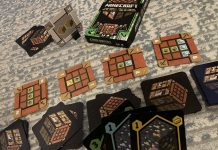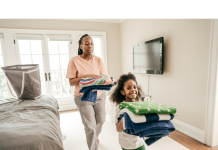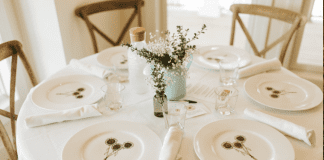My pandemic anxiety peaked around July. I could not deny that we would still be facing COVID-19 in the fall and needed to make difficult back-to-school decisions. This dilemma, coupled with months of political tension, violent protests, and an overarching sense of unease, led me to a desperate question: Do I stay or do I go?
What started as a joke – a “hey, here’s a crazy idea” midnight rant – led my family of five transplanting from St. Louis to rural France just six weeks later.
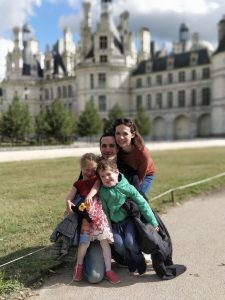
As it turned out, fantasizing about leaving the country was a real possibility, thanks to my French husband, whose passport allowed us to have an exception to the European travel ban. The decision wasn’t easy, but neither was the idea of facing a year of remote learning with our three young kids. So, in a year with no guarantees, we decided, “why not?” France wasn’t perfect, but it had dealt with COVID without political drama and kept the schools open. Plus, it meant reconnecting with extended family and strengthening our kids’ second language skills. All in all, it was enough for me to say “au revoir St. Louis” – at least until things settled down.
Organizing an international move with three children under the age of five took precision but also felt like something we’d been training to do. We’ve gone through several big moves and travel regularly with our kids. Of course, this time was different, with details like finding a house, organizing visas, and making sure our jobs were ok with us being slightly more remote for a while … but it all worked out. A few weeks, fifteen suitcases, and two COVID tests later, we waved goodbye to St. Louis from an airplane over the Mississippi.
After landing in France, we were tested again and headed straight to the countryside for a two-week quarantine. This gave us time to adjust to jet lag and enjoy a change of scenery, which felt glorious after six months of basically staying put at home.
 Once we got the all-clear, we settled into our new life in the Loire Valley, a region in central France known for its amazing wine, abundance of castles, royal history, and lush landscapes. With only a thousand people, our village is tiny. We live in the kind of place where literally everyone knows your name (especially if you’re part of the loud American family who moved in during the middle of the pandemic). I have been truly surprised by how welcoming people have been. Unlike the surly streets of Paris, we always get a “bonjour” and a smile from folks on the street. And while there honestly isn’t too much to do here, what there is, is straight out of a provincial French fairytale: charming cobblestone streets, a fragrant bakery, parks, a library, and a Saturday market with five-star cheeses, meats, and wine.
Once we got the all-clear, we settled into our new life in the Loire Valley, a region in central France known for its amazing wine, abundance of castles, royal history, and lush landscapes. With only a thousand people, our village is tiny. We live in the kind of place where literally everyone knows your name (especially if you’re part of the loud American family who moved in during the middle of the pandemic). I have been truly surprised by how welcoming people have been. Unlike the surly streets of Paris, we always get a “bonjour” and a smile from folks on the street. And while there honestly isn’t too much to do here, what there is, is straight out of a provincial French fairytale: charming cobblestone streets, a fragrant bakery, parks, a library, and a Saturday market with five-star cheeses, meats, and wine.
Our kids attend the French public elementary school just across the street. Schools in France closed during the first COVID wave, then reopened in the fall. After learning more about the role children play in transmitting the virus, the administration decided that the educational, mental health, and societal effects of school closures was not justifiable.
After just a few months of full French immersion, my four-year-old daughter has gone from knowing basic vocabulary to being nearly fluent. The experience has reminded me how adaptable and resilient kids really are. They’ve even gotten used to the cafeteria’s French cuisine, served in five courses, including cheese. The beef bourguignon and french fries always go over well, but cow tongue gets a unanimous “beurk!” (“yuck” in French).
To be clear, we didn’t escape the pandemic by moving to France. We live with it every day. The numbers here are higher than ever. Adults are required to wear masks, and the country just ended a national lockdown that closed restaurants and non-essential shops. But somehow, there is comfort in the control. The French government is dignified and pragmatic, communicating guidelines that apply to everyone, regardless of their city or region. Every time we left home during the lockdown, we needed to open an app and select an approved reason for leaving (such as groceries, school runs, or exercise). It sounds intrusive, but we got used to it pretty quickly.
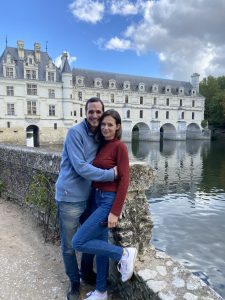
With the kids thriving in school and my husband happily back in his homeland, I’ve probably had the hardest time adjusting to our new life. I thought I’d miss my suburban comforts more (AC, central heating, and a garbage disposal, to name a few), but just like my kids, I’ve adapted. Plus, I still have Netflix, Amazon, and fine French wine at Costco prices, so my essentials are covered.
So here we are, and here we’ll stay – at least for a little while longer. We miss our American family terribly, but we FaceTime with them every day. When it gets especially tough, I think of the gift we are giving the kids. We’re showing them the world and teaching them to appreciate different walks of life. Most importantly, we’re strengthening their connection to their French identity.
There are many lessons we can draw from 2020. For me, this is a reminder that going outside my comfort zone and doing something that sounds crazy, complicated, or impossible adds a new chapter to my life story – even if it’s really hard. Did I mention the wine?
 Jeannie is a St. Louis native, currently living in France. She is a mama to 3 kids (Maxime, 5, Isabelle, 4 and Juliette, 1). She’s loved traveling from an early age and always wished for it to become a big part of her life. After school, Jeannie worked as a marketing director in Germany and NYC. Then, as fate would have it, she met a French guy named Guillaume, got married in Paris, and became an official Francophile. Together, they’ve traveled the world and made homes in San Francisco, Chicago, St. Louis, and France. They are currently living in the Loire Valley, where Jeannie takes care of the kids while also working as a marketing consultant— all while trying to navigate the language and cultural barriers of living abroad. When she’s not eating French food or shopping for it, Jeannie loves exploring new cities, crafting with her kids, and taking long bike rides.
Jeannie is a St. Louis native, currently living in France. She is a mama to 3 kids (Maxime, 5, Isabelle, 4 and Juliette, 1). She’s loved traveling from an early age and always wished for it to become a big part of her life. After school, Jeannie worked as a marketing director in Germany and NYC. Then, as fate would have it, she met a French guy named Guillaume, got married in Paris, and became an official Francophile. Together, they’ve traveled the world and made homes in San Francisco, Chicago, St. Louis, and France. They are currently living in the Loire Valley, where Jeannie takes care of the kids while also working as a marketing consultant— all while trying to navigate the language and cultural barriers of living abroad. When she’s not eating French food or shopping for it, Jeannie loves exploring new cities, crafting with her kids, and taking long bike rides.



